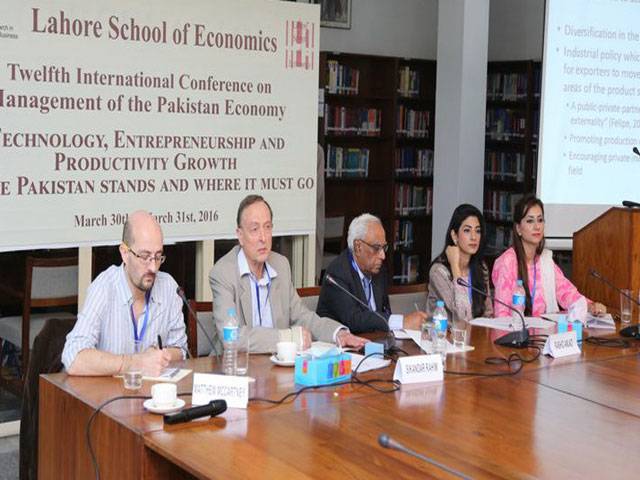LAHORE - The Lahore School of Economics hosted its twelfth international annual conference on management of the Pakistan economy at its Main Burki Campus Wednesday.
The theme of this conference is “Technology, entrepreneurship and productivity Growth – Where Pakistan stands and where it must go” and the two-day event will be devoted to discussions on the challenges and constraints faced in accelerating technology and productivity growth in Pakistan.
The conference started with welcoming remarks by Dr Naved Hamid (Professor of Economics and Director, Centre for Research in Economics and Business, Lahore School of Economics). He remarked that the timing of this year’s conference fit well with the need of the hour as all the issues the Conference aimed to address are very relevant to the issues confronted by Pakistan’s economy at present.
In his keynote speech, Dr Bilal U Haq (Research Professor at the Smithsonian Institute, Washington and at the Sorbonne University, Paris) outlined some of the issues that Pakistan faces that encumber innovation and enterprise. Drawing lessons from international experience, he concluded that scientific research does not always require large investment of funds. In fact, it requires a special mix of encouragement and R&D incentives from the government and industry.
Dr Irfanul Haque (Special Advisor, Finance and Development, South Centre, Geneva) concluded the first session with his presentation. He discussed the critical importance that innovation plays in economic growth and concluded with a few suggestions on how science and technology can be promoted in Pakistan.
The second session of the conference focused on Pakistan’s productivity performance. The first speaker, Dr Rashid Amjad (Professor of Economics and Director, Graduate Institute of Development Studies, Lahore) and Namra Awais (Research Fellow, Graduate Institute of Development Studies, Lahore) explored the contribution that physical capital, human capital and TFP (total factor productivity) make to labour productivity in the overall economy as well as for agriculture, industry and services over the last 35 years in Pakistan. Dr Amjad highlighted a better-educated and trained workforce to be one of the key factors that can lead to substantial gains in economic performance.
Carrying forward the discussion on Pakistan’s productivity performance, Dr Matthew McCartney (Director of South Asian Studies; Associate Professor in the Political Economy and Human Development of India, University of Oxford, UK) highlighted the remarkable robustness of GDP growth in Pakistan since the time of independence, despite significant transformation in the structure of its economy.
He concluded with a discussion on the historical and comparative productivity performance of Pakistan in the context of successful technological change in South Asia.
The second session concluded with a presentation by Uzma Afzal(Assistant Professor, Lahore School of Economics) on her co-authored work with Maha Khan (Teaching Fellow, Lahore School of Economics).
The third session of the day discussed innovation, entrepreneurship and technological progress. Dr Waqar Ahmed Wadho (Assistant Professor, Lahore School of Economics) discussed the innovation in the textiles sector of Pakistan, from his co-authored work with Dr Azam Chaudhry (Professor and Dean of Economics, Lahore School of Economics).
Dr Rajah Rasiah (Professor of International Development at the Faculty of Economics and Administration, University of Malaya) spoke on the experience of East Asian economies in their efforts to promote economic growth.
Dr Hanns Pichler, (Vienna University of Economics and Business, former Senior Schumpeter Fellow, Centre for European Studies, Harvard University, USA) presented his analysis of the innovations in Austrian small and medium enterprises.
The last session of the day was devoted to discussions on productivity differences and the technological catch-up process in industries of Pakistan.
The day concluded with a talk given by Dr Azam Chaudhry, summarizing the findings from production mapping conducted in the aforementioned studies. He highlighted the insights these studies provide into the catch-up process in Pakistan and what implications we can draw for policy formation.
Saturday, November 23, 2024
LSE hosts 12th int’l conference on management of Pak economy

RDA suspends Metro operations in guise of routine maintenance
November 23, 2024
IMCG Bharakahu holds investiture ceremony of Student Council
November 23, 2024
RCCI urges to intensify collective efforts for addressing smog issue
November 23, 2024
Search operations conducted in different areas to net criminals
November 23, 2024
-
Lahore tops global pollution rankings as smog worsens, AQI reaches hazardous levels
-
Lahore tops global pollution rankings as smog worsens, AQI reaches hazardous levels
-
Hunger crisis to increase in South Sudan, warns UN
-
Pakistan’s judiciary champions climate justice at COP29 in Baku
-
Punjab struggles with persistent smog as Met Office forecast rainfall
-
Punjab residents face escalating smog crisis as pollution levels soar across country
UN Crossroads
November 22, 2024
Smog Trade-off
November 22, 2024
Undersiege Again
November 22, 2024
Land of Vigilantes
November 21, 2024
United in Genocide
November 21, 2024
Proposal to counter increasing cases of harassment
November 22, 2024
Critique of RFE/RL’s Coverage of the SCO Summit
November 22, 2024
Real vs Reel
November 22, 2024
Independent Supreme Court
November 21, 2024
Tackle Corruption Within School Boards
November 20, 2024
ePaper - Nawaiwaqt
Nawaiwaqt Group | Copyright © 2024





